The 153-page report, '''All You Can Do is Pray': Crimes Against Humanity and Ethnic Cleansing of Rohingya Muslims in Burma's Arakan State,'' describes the role of the Burmese government and local authorities in the forcible displacement of more than 125,000 Rohingya and other Muslims and the ongoing humanitarian crisis.
Burmese officials, community leaders, and Buddhist monks organised and encouraged ethnic Arakanese backed by state security forces to conduct coordinated attacks on Muslim neighborhoods and villages in October 2012 to terrorise and forcibly relocate the population.
The tens of thousands of displaced have been denied access to humanitarian aid and been unable to return home.
''The Burmese government engaged in a campaign of ethnic cleansing against the Rohingya that continues today through the denial of aid and restrictions on movement,'' said Phil Robertson, deputy Asia director.
''The government needs to put an immediate stop to the abuses and hold the perpetrators accountable or it will be responsible for further violence against ethnic and religious minorities in the country.''
Following sectarian violence between Arakanese and Rohingya in June 2012, government authorities destroyed mosques, conducted violent mass arrests, and blocked aid to displaced Muslims.
On October 23, after months of meetings and public statements promoting ethnic cleansing, Arakanese mobs attacked Muslim communities in nine townships, razing villages and killing residents while security forces stood aside or assisted the assailants. Some of the dead were buried in mass graves, further impeding accountability.
Human Rights Watch traveled to Arakan State [also known as Rakhine] following the waves of violence and abuses in June and October, visiting sites of attacks and every major displaced person camp, as well as unofficial displacement sites.
The report draws on more than 100 interviews with Rohingya and non-Rohingya Muslims and Arakanese who suffered or witnessed abuses, as well as some organizers and perpetrators of the violence.
All of the state security forces operating in Arakan State are implicated in failing to prevent atrocities or directly participating in them, including local police, Lon Thein riot police, the inter-agency border control force called Nasaka, and the army and navy.
One soldier told a Muslim man who was pleading for protection as his village was being burned: ''The only thing you can do is pray to save your lives.''
Displaced Rohingya told Human Rights Watch how in October security forces stood by or joined with large groups of Arakanese men armed with machetes, swords, homemade guns, and Molotov cocktails who descended upon and attacked their villages.
In some cases, attacks occurred simultaneously in townships separated by considerable distance.
Satellite images obtained by Human Rights Watch from just five of the 13 townships that experienced violence since June show 27 unique zones of destruction, including the destruction of 4862 structures covering 348 acres of mostly Muslim-owned residential property.
In the deadliest incident, on October 23, at least 70 Rohingya were killed in a daylong massacre in Yan Thei village in Mrauk-U Township.
Despite advance warning of the attack, only a small number of riot police, local police, and army soldiers were on duty to provide security, but they assisted the killings by disarming the Rohingya of their sticks and other rudimentary weapons they carried to defend themselves.
Included in the death toll were 28 children who were hacked to death, including 13 under age five. ''First the soldiers told us, 'Do not do anything, we will protect you, we will save you,' so we trusted them,'' a 25-year-old survivor told Human Rights Watch.
''But later they broke that promise. The Arakanese beat and killed us very easily. The security did not protect us from them.''
''In October, security forces either looked the other way as Arakanese mobs attacked Muslim settlements or joined in the bloodletting and arson,'' Robertson said.
''Six months later, the government still blames 'communal violence' for the deaths and destruction when, in truth, the government knew what was happening and could have stopped it.''
Considerable local organising preceded and backed October's attacks. The two groups most influential in organising anti-Rohingya activities were the local order of Buddhist monks (the sangha) and the regionally powerful Rakhine Nationalities Development Party (RNDP), which was founded in 2010 by Arakanese nationalists.
Between June and October, these groups and others issued numerous anti-Rohingya pamphlets and public statements, explicitly or implicitly denying the existence of the Rohingya ethnicity, demonising them, and calling for their removal from the country, at times using the phrase ''ethnic cleansing.''
The statements frequently were released in connection with organised meetings and in full view of local, state, and national authorities who raised no concerns.
Local authorities, politicians, and monks also acted, often through public statements and force, to deny Muslims their rights to freedom of movement, opportunities to earn a living, and access to markets and to humanitarian aid.
The apparent goal has been to coerce them to abandon their homes and leave the area.
''Local officials and community leaders engaged in an organised effort to demonise and isolate the Muslim population as a prelude to murderous mob attacks,'' Robertson said.
''Moreover, since the bloodshed, the central government has taken no action to punish those responsible or reverse the ethnic cleansing of the forcibly displaced Muslims.''
Human Rights Watch uncovered evidence of four mass-grave sites in Arakan State - three dating from the immediate aftermath of the June violence and one from the October violence.
Security forces actively impeded accountability and justice by digging mass graves to destroy evidence of crimes.
For instance, on June 13, a government truck dumped 18 naked and half-clothed bodies near a Rohingya displaced person camp outside of Sittwe, the state capital.
Some of the victims had been ''hogtied'' with string or plastic strips before being executed. By leaving the bodies near a camp for displaced Rohingya, the soldiers were sending a message - consistent with a policy of ethnic cleansing - that the Rohingya should leave permanently.
''They dropped the bodies right here,'' said a Rohingya man, who saw the bodies being dumped. ''Three bodies had gunshot wounds. Some had burns, some had stab wounds. One gunshot wound was on the forehead, one on the chest.''
Arakan State faces a major humanitarian crisis brought on by the Burmese government's systematic restrictions on humanitarian aid to displaced Rohingya.
More than 125,000 Rohingya and non-Rohingya Muslims, and a smaller number of Arakanese, have been in displaced person camps in Arakan State since June.
While President Thein Sein's government has hosted high-profile diplomatic visits to displacement sites, it has also obstructed the effective delivery of humanitarian aid.
Many of the displaced Muslims have been living in overcrowded camps that lack adequate food, shelter, water and sanitation, schools, and medical care.
Security forces in some areas have provided protection to displaced Muslims, but more typically they have acted as their jailers, preventing access to markets, livelihoods, and humanitarian assistance, for which many are in desperate need.
Tens of thousands of Rohingya face a range of deadly waterborne diseases if they are not moved to higher ground before the rainy season begins in May.
''The problem with aid delivery in Arakan State is not a failure of coordination, but a failure of leadership by the government to allow displaced Muslims access to aid and freedom of movement,'' Robertson said.
''An entirely predictable and preventable humanitarian crisis is just weeks away when the rains fall and camps flood, spreading waterborne diseases.''
The displaced Rohingya have not been consulted on their right to return to their original towns and villages, heightening concerns of a long-term intent to segregate the population.
Lacking aid, protection, and facing violence and abuses, tens of thousands of Rohingya have fled the country by sea since June with hopes of reaching Bangladesh, Malaysia, or Thailand, and many thousands more appear ready to do the same - several hundred people have already died at sea.
Under international law, crimes against humanity are crimes committed as part of a widespread or systematic attack by a government or organisation on a civilian population. Among the crimes against humanity committed against the Rohingya since June were murder, deportation and forcible transfer of the population, and persecution.
''Ethnic cleansing,'' though not a formal legal term, has been defined as a purposeful policy by an ethnic or religious group to remove by violent and terror-inspiring means the civilian population of another ethnic or religious group from certain geographic areas.
Central to the persecution of the Rohingya is the 1982 Citizenship Law, which effectively denies Burmese citizenship to Rohingya on discriminatory ethnic grounds.
Because the law does not consider the Rohingya to be one of the eight recognized ''national races,'' which would entitle them to full citizenship, they must provide ''conclusive evidence'' that their ancestors settled in Burma before independence in 1948, a difficult if not impossible task for most Rohingya families.
The government and Burmese society openly consider the Rohingya to be illegal immigrants from what is now Bangladesh and not a distinct ''national race'' of Burma, denying them consideration for full citizenship. Official government statements refer to them as ''Bengali,'' ''so-called Rohingya,'' or the pejorative ''kalar.''
Human Rights Watch urged the Burmese government to urgently amend the 1982 Citizenship Act to eliminate discriminatory provisions and to ensure that Rohingya children have the right to acquire a nationality where otherwise they would be stateless.
''Burma should accept an independent international commission to investigate crimes against humanity in Arakan State, locate victims, and provide redress,'' said Robertson.
''Burma's donors need to wake up and realise the seriousness of the Rohingya's plight, and demand that the government urgently stop abuses, promote the safe return of displaced Muslims, and ensure accountability to end the deadly cycle of violence in Arakan State.''

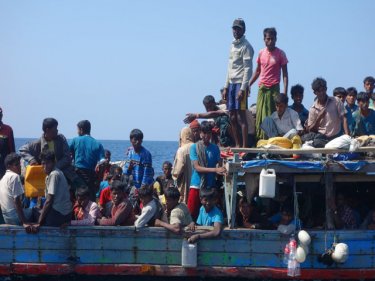
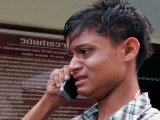
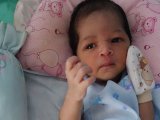
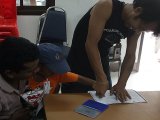
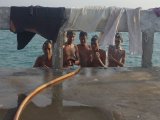

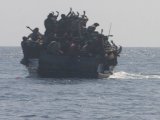
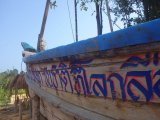
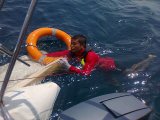
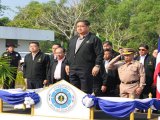
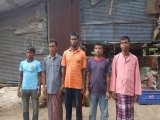
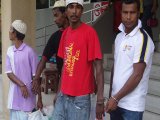
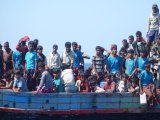
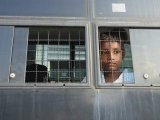

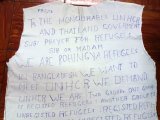
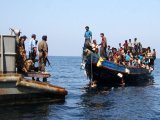
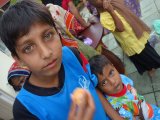
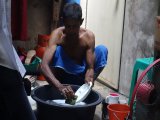

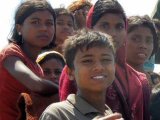
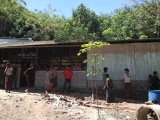
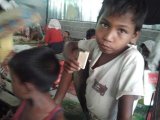
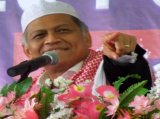
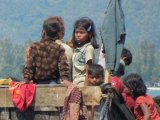
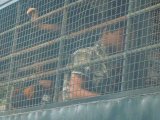
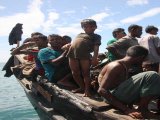
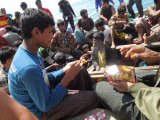




Still wondering why the Muslims have an issue with the rest of the world? This is the Bosnian genocide beginning all over again and nothing will be done until thousands are killed. Then the UN will just bring everything to a lengthy trial and somewhere else in the world starts this all over again.
Posted by May on April 22, 2013 11:08